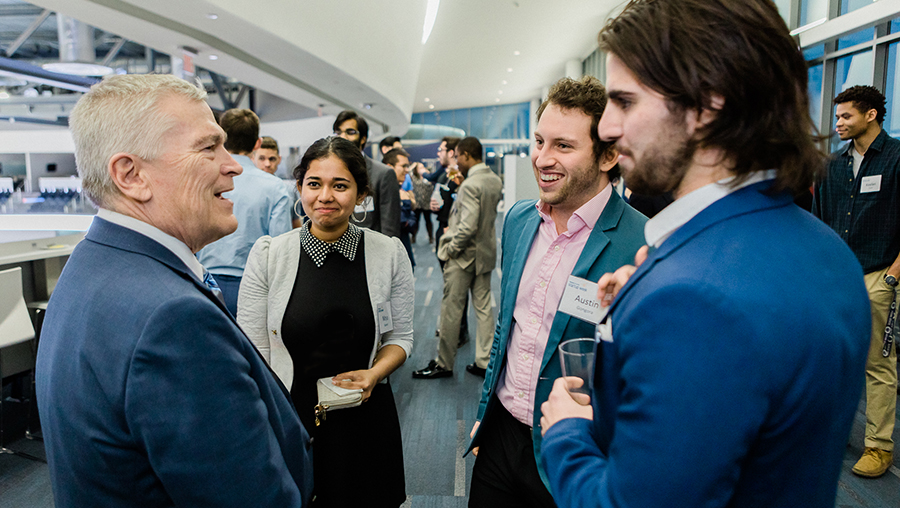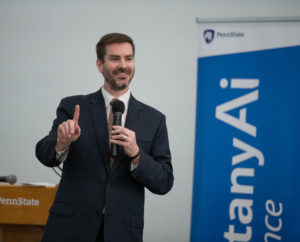
Ten student teams at Penn State will each receive $1,500 from the Nittany AI Alliance to move on to Phase Three of the Nittany AI Challenge. This prize is in addition to the $500 they won during Phase One.
Teams competing in the Challenge are directed to use the prize money to create a minimum viable product (MVP) using the artificial intelligence platform of their choosing to address real-world problems facing students at the University. AI companies including Amazon, Google, Microsoft, and Oracle offer hands-on workshops during the Challenge to assist students with development.
Teams selected to move on to Phase Three:
Revu
Revu is a solution to help keep students engaged when completing reading assignments. The AI powered application is designed to generate multiple-choice quizzes to help readers stay focused, while also testing their comprehension of key concepts.
AIODA (AI On-Demand Advising)
AIODA is designed to serve as an academic tool for both the student and advisor. The smart academic chatbot utilizes machine learning to help students answer on-demand academic questions and serves as a pre-screening tool for advisors.
CourseCat: A Smarter Course Catalog
CourseCat is designed to assist students in their search to find courses offered at Penn State. The search platform uses natural language processing to make course recommendations and help students explore courses based on their content.
LionPad
LionPad is designed to provide students with the resources they need to efficiently navigate all stages of the housing process and connect them with living situations that may fit their goals.
Deep Sign
Deep Sign is designed to tackle communication issues for the aurally challenged, with the goal of enhancing the quality and clarity of interaction with others through the assistance of AI.
uApplication
uApplication is designed to be an online marketplace to search for counselors and mentors who can help with admissions consulting. The solution provides feedback tailored specifically to each students profile, choices, interests, strengths, weaknesses and personality.
Resilient Resumes
Resilient Resumes is designed to guide students through the resume crafting process. The application utilizes Artificial Intelligence technology to provide feedback from human resource hiring experts. The team is participating from Penn State Berks.
EngagePSU
EngagePSU is designed to make it easier to navigate different aspects of campus life like joining a club, doing field research, or attending a campus event, by providing up-to-date information in one location.
NSO QuickAdvisor
NSO QuickAdvisor is a virtual assistant designed to answer common advising questions asked during Penn State’s New Student Orientation (NSO). The goal of the tool is to free-up advisors from answering common questions to allow more time for in-depth conversations about course selections.
AleMS: AI Energy Management System
AleMS is designed for Penn State building managers to gather insights with a goal of creating sustainable campuses. The team is participating from Penn State Great Valley.
 Brad Zdenek, innovation strategist for the Nittany AI Alliance, said the Nittany AI Challenge offers a unique opportunity for students.
Brad Zdenek, innovation strategist for the Nittany AI Alliance, said the Nittany AI Challenge offers a unique opportunity for students.
“Students working on solutions using AI technology are getting experience in applying their skills, passion and drive to problems that have real meaning to Penn State,” Zdenek said. “Whether through taking on the enormous task of managing energy use or leveraging AI to build a better course material reading experience, our top ten teams exemplify the innovative spirit of our community and the potential power of AI to improve our lives.”
Kevin Murray, chief executive officer for Mission Critical Partners, LLC. is part of the judging panel for the Nittany AI Challenge.
“Being involved in the Nittany AI Challenge is an exciting opportunity. Every student brings passion and a unique perspective that will help us better understand how society can leverage AI to make better decisions and solve complex problems,” Murray said. “In my role as chairman and CEO of a State College-based public safety services firm, I’m especially captivated by their ideas as our organization explores how to unlock AI’s power to provide faster and better emergency response outcomes for our communities nationwide.”
The ten teams competing in Phase Three of the Nittany AI Challenge will be required to submit their MVP by August 2, 2019. Teams will then present their MVP to a panel of judges on September 10, 2019 at Freeman Auditorium in Hetzel Union Building (HUB) on the University Park campus. The panel will award additional funding from the remaining pool of $25,000 to select projects.

